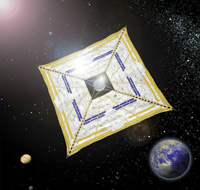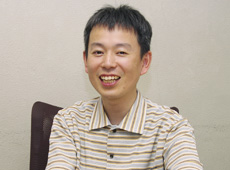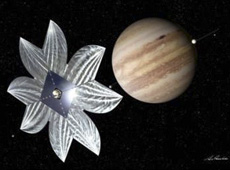Q. How do you think the technology developed for IKAROS can be applied on Earth?

Solar Power Sail Demonstrator IKAROS
The thin-film solar cell attached to the sail is lighter than solar cells normally used for artificial satellites, and easier to handle. It could be a breakthrough in photovoltaic power generation. In the future, if we can supply thin solar cells through stable mass production, they will be widely used by the public, and I think this will help solve environmental problems. In addition, the thin solar cell technology can be used for space solar power system.
Q. When did you develop an interest in space?
As a child, I was interested in the nature around me rather than space. For example, I liked insects and had an interest in the sea and mountains. I liked to look up at the starry skies, and saw them as a part of nature. What inspired me to pursue space science was the U.S. Interstellar Mission Voyager, which I saw on TV when I was in high school. At that time, Voyager 2 passed over Neptune and was about to travel outside the Solar System, and the people who worked on the mission were having a party. I watched that scene on TV, and was surprised by the Voyager spacecraft. And at the same time, I was impressed that this many people were involved in a planetary exploration mission. That's when I thought I'd like to become involved in space missions myself.
Q. What do you think is the significance of exploring the planets of the Solar System?

Ultimately, humanity is about a spirit of adventure. Some people say, "I'll climb this mountain because it's there." This thinking is close to defining that spirit of adventure. If we explore another planet, we can learn so many things, and advance our understanding of space. In particular, we can learn about the history of human life and the origin of Earth and space. However, I think the bigger underlining reason for planetary exploration is the inquiring nature that human beings possess from birth. One of the prime reasons I wanted to explore Jupiter is that Japanese prove has never been there. And after doing that, I'm pretty sure that I would want to go to Saturn, Uranus and Neptune as well.
However, as long as we are using taxpayers' money, we cannot just follow our interests for their own sake. We'd like to achieve global-leading breakthroughs in physics and engineering. The uses of advanced technology are not limited to the space field; they can be applied to various sectors in the future. I believe this work will benefit our daily lives.
Q. Can you tell us about your dreams for the future?
My son is only two years old, but he is interested in vehicles such as trains, buses, cars and ships. In particular, he loves trains, and he is not satisfied until he rides different kinds of trains. So when I take him on train rides on weekends, he is very happy. I hope that spaceships can become a familiar vehicle for the general public, and that the era arrives when we can go on spaceship adventures ourselves. I would like to build a spaceship that children can travel on.
Assistant Professor, JAXA Space Exploration Center
Dr. Mori received a Master's degree in Mechanical Sciences and Engineering at the Graduate School of Science and Engineering of the Tokyo Institute of Technology in 1999, and was appointed Assistant Professor in the Department of Mechano-Aerospace Engineering at the same institute. Dr. Mori became an assistant researcher for space navigation systems at the JAXA Institute of Space and Astronautical Science in 2003. He has been involved in the operation of the Asteroid Explorer HAYABUSA, the launch of the M-V Launch Vehicle, S-310 observation rocket experiments, and balloon experiments. Currently, he is a project leader for the Solar Power Sail Demonstrator IKAROS. His specialty is dynamics, controls and spacecraft systems.
| Related Link: | Small Power Sail Demonstrator IKAROS |
Japan and Europe Explore the Mysterious World of Mercury
Space Yacht: using sunlight to cruise through space
